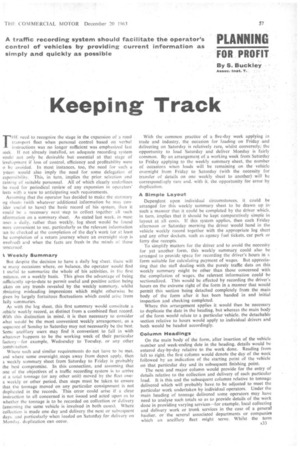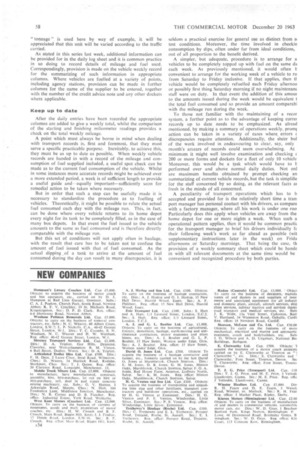Keeping Track
Page 59

Page 60

If you've noticed an error in this article please click here to report it so we can fix it.
IFHE need to recognize the stage in the expansion of a road transport fleet when personal control based on verbal instructions was no longer sufficient was emphasized last veek. If not already installed, an adequate recording system void(' not only be desirable but essential at that stage of levelopment if loss of control, efficiency and profitability were o be avoided. In most instances, too, the need for such a ystern would also imply the need for some delegation of esponsibilitv. This, in turn, implies the prior selection and raining of suitable personnel. All of which clearly underlines he need for periodical review of any expansion in operators' leets with a view to anticipating such requirements.
Assuming that the operator has decided to make the statutory og sheets (with whatever additional information he may conider useful to have) the basic record of his system, then it vould he a necessary next 'step to collect together all such nformation on a summary sheet. As stated last week, in most 'ases a daily, rather than weekly, log sheet would be found nore convenient to use, particularly as the relevant information an be checked at the completion of the day's work (or at least he completion of a return. journey where an overnight stop is nvolved) and when the facts are fresh in the minds of those :oncerncd.
k Weekly Summary But despite the decision to have a daily log sheet. there will )e many occasions where, on balance, the operator would find t useful to summarize the whole of his activities, in the first nstance, on a weekly basis. This gives the advantage of being iufFicieatly up-to-date to permit useful and positive action being .aken on any trends revealed by the weekly summary, whilst obviating misleading impressions which might otherwise be Oven by largely fortuitous fluctuations which could arise from laity summaries.
As with the log sheet, this first summary would constitute a /chicle weekly record, as distinct from a combined fleet record. Nith this distinction in mind. it is then necessary to consider what would be the most convenient weekly arrangement, as a iequence of Sunday to Saturday may not necessarily be the best. some ancillary users may find it convenient to fall in with whatever happens to be the working week of their particular factory—for example, Wednesday to Tuesday, or any .other zomhination.
Where such and similar requirements do not have to be met. and where some overnight,,stops away from depot apply, then a weekly summary sheet from Saturday to Friday is probably the hest compromise. In this connection, and assuming that one of the objectives of a traffic recording system is to arrive it a total tonnage (or any other unit) moved by the fleet over a weekly or other period, then steps must, be taken to ensure that the tonnage moved on any particular consignment is not duplicated in the records. 'This error could arise if a clear instruction to all concerned is not issued and acted upon as to whether the tonnage is to be recorded on collection or delivery (assuming the same vehicle is involved in both cases). Where collection is made one day and delivery the next or subsequent days. and particularly when loaded on Saturday.for delivery on Monday. duplication can occur.
With the common practice of a five-day week applying in trade and industry, the occasion for loading on Friday and delivering on Saturday is relatively rare, whilst conversely; the opportunity to load Saturday and deliver Monday is fairly common. By an arrangement of a working week from Saturday to Friday applying to the weekly summary 'sheet, the number of occasions when loads will be remaining on the vehicle overnight from Friday to Saturday (with the necessity for transfer of details on one weekly sheet to another) will be correspondingly rare and, with it, the opportunity for error by duplication.
A Simple Layout •
Dependent upon individual circumstances, it could be arranged for this weekly summary sheet to be drawn up in. such a manner that it could be completed by the driver which, in turn, implies that it should be kept comparatively simple in layout at all costs. If this system applies, then each Friday afternoon or Saturday morning the driver would hand in the vehicle weekly record together with the appropriate log sheet and any other dockets. such as. agency fuel tickets, car park or ferry due receipts.
To simplify matters for the driver and to avoid the necessity for yet another form, this weekly summary could also be arranged to provide space for recording the driver's hours in a form suitable for calculating payment of wages. But appreciating that the staff dealing with, the purely traffic data on this weekly summary might be other than those concerned with the compilation of wages, the relevant information could be sectionalized. This would be effected by recording the driver's hours on the extreme right of the form in a manner that would permit this section being detached completely from the main body of the form after it has been handed in and initial inspection and checking completed.
Where this arrangement applies it would then be necessary to duplicate the date in the heading, but whereas the main body of the form would relate to a particular vehicle, the detachable section relative to hours would apply to individual drivers and both would be headed accordingly.
Column Headings On the main body of the form. after insertion of the vehicle number and week-ending date in the heading, details would be entered day-by-day relative to the work done. Reading from left to right, the first column would denote the day of the week followed by an indication of the starting point of the vehicle on that particular day and its subsequent finishing point. The next and major column would provide for the entry of details relative to the collection and delivery of each particular load. It is this and the subsequent columns relative to tonnage delivered which will probably have to be adjusted to meet the particular work undertaken by individual operators. Under the main heading of tonnage delivered some operators may have need to analyse such totals so as to provide details of the work done in providing varying services—for example, local collecting and delivery work or trunk services in the case of a general haulier, or the several associated departments or companies which an ancillary fleet might serve. Whilst the term
tonnage" is used here by way of example, it will be appreciated that this unit will be varied according to the traffic carried.
As stated in this series last week, additional information can be provided for in the daily log sheet and it is common practice in so doing to record details of mileage and fuel used. Correspondingly, provision is made on the vehicle weekly record for the summarizing of such information in appropriate columns. Where vehicles are fuelled at a variety of points, including agency stations, provision can be made in further columns for the name of the supplier to be entered, together with the number of the credit advice note and any other dockets where applicable.
Keep up to date After the daily entries have been recorded the appropriate columns are added to give a weekly total, whilst the comparison of the starting and finishing mileometer readings provides a check on the total weekly mileage.
A point which must always be borne in mind when dealing with transport records is, first and foremost, that they must serve a specific practicable purpose. inevitably, to achieve this, they must be as up to date as possible. When weekly vehicle records are handed in with a record of the mileage and consumption of fuel supplied included, a useful spot check can be made as to the current fuel consumption of the vehicle. Whilst in some instances more accurate records might be achieved over a more extended period, a week is of sufficient length to provide a useful guide and—equally important—sufficiently soon for remedial action to be taken where necessary.
But in order that such a step can be usefully made it is necessary to standardize the procedure as to fuelling of vehicles. Theoretically, it might be possible to relate the actual fuel consumed each day with the mileage run. This, in fact, can be done where every vehicle returns to its home depot every night for its tank to be completely filled, as in the case of many bus depots. In that event the fuel issued to the vehicle amounts to the same as fuel consumed and is therefore directly comparable with the mileage run.
But this set of conditions will not apply often in haulage, with the result that care has to be taken not to confuse the amount of fuel issued with that of fuel consumed. As the actual dipping ,of a tank to arrive at the amount of fuel consumed during the day can result in many discrepancies, it is seldom a practical exercise for general use as distinct from sl test conditions. Moreover,. the time involved in cheekin consumption by dips, often under far from ideal conditions, out of all proportion to the benefit derived.
A simpler, but adequate, procedure is to arrange for a vehicles to be completely topped up with fuel on the same da each week. As previously mentioned, it would often t convenient to arrange for the working week of a vehicle to ru from Saturday to Friday inclusive. If that applies, then ti vehicle would be completely refuelled each Friday afternoo or possibly first thing Saturday morning if no night maintenanc staff were on duty. In that event the addition of this amour to the amounts issued during the week would be equivalent I the total fuel consumed and so provide an amount comparabl with the mileage run during the week.
To those not familiar with the maintaining of a recor system, a further point as to the advantage of keeping currer records up to date needs to be emphasized. As alread mentioned, by making a summary of operations weekly, promi action can be taken in a variety of cases where, errors diScrepancies require attention. Additionally, the shder but of the work involved in endeavouring to clear, say, only month's anears of records could seem overwhelming. At minimum it might well involve examination and checking r 200 or more forms and dockets for a fleet of only 10 vehicle Moreover, this would be a task which would have to E performed over and above normal daily duties. Not onl are maximum benefits obtained by prompt checking an summarizing of current vehicle records, but the task is simplifie for the staff concerned by so doing, as the relevant facts al fresh in the minds of all concerned.
A peculiarity of transport operations which has to b accepted and provided for is the relatively short time a trail: port manager has personal contact with his drivers, as compare with a factory manager, where all his work is under one roo Particularly does this apply when vehicles are away from the home depot for one or more nights a week. When such a operational pattern applies, then it would be common practic for the transport manager to brief his drivers individually ft their following week's work as far ahead as possible (wit supplementary -instructions., later in the week) on Frida afternoons or Saturday .mornings. That being the case, th provision. of a weekly summary sheet which could be hande in with all relevant documents at the same time would be convenient and recognized procedure by both parties.




























































































